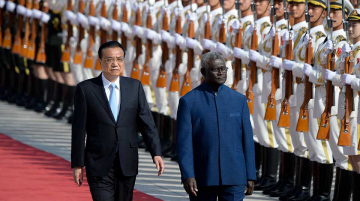
By Lukas Fiala
In April, China confirmed the signing of a bilateral security agreement with the Solomon Islands, a supposed draft of which had been leaked a few weeks earlier. Last week, Chinese Foreign Minister Wang Yi embarked on an ambitious 10-day tour across eight small island states of the Southwest Pacific, aiming to further strengthen regional cooperation as well as position China as the partner of choice on key development and security issues.
Unsurprisingly, Wang’s visit and the security agreement raised more than a few eyebrows across Western capitals, prompting Kurt Campbell, Indo-Pacific Coordinator on the National Security Council, to visit the region in April. Australia also joined this tit-for-tat diplomacy with announced visits to Samoa and Tonga this week.
Although China could not convince the ten Pacific Islands states to sign-up for its development and security plan, many analysts have been writing about the strategic implications of China’s activities. Some have warned of a potential Chinese military installation in the Solomon Islands overlooking the strategically located archipelago, expanding China’s ability to project power within the second island chain with implications for a potential future Taiwan contingency. Others have discussed whether the Solomon Islands agreement signals the emergence of a more interventionist Beijing willing to militarily prop up friendly governments, reminiscent of Cold War-era geopolitics.
What we should also focus on, however, is the broader evolution of how security has become a part of China’s toolkit to consolidate diplomatic relationships across the Global South. The wider Horn of Africa and especially Djibouti, where China’s first overseas military logistics was inaugurated in 2017, hold interesting insights for explanations of China’s engagement on the other side of the Indo-Pacific region.
Prior to 2012, formal security and military cooperation had remained on the margins of China-Africa cooperation, notwithstanding China’s prior support for African independence movements during the Cold War. Several exogenous shocks, however, prompted Beijing to change track. The war in Darfur, the crisis in Libya and the ensuing evacuation of some 36,000 Chinese nationals, and the rise of piracy in the Gulf of Aden off the coast of Somalia, instigated Beijing to shoulder more responsibilities by upholding regional security while also protecting Chinese citizens and assets on the continent.
Far from a futile exercise, China’s reengagement in Africa’s security landscape provided Beijing’s diplomats and the People’s Liberation Army with much-needed experience in crisis diplomacy and military operations overseas. As Daniel Large wrote a few years ago, Sudan and South Sudan were in many ways a ‘testing ground’ for China’s security engagements abroad, reflecting Beijing’s growing appetite to set the table to foster negotiations among conflict parties and contribute combat troops to UN Peacekeeping missions.
As a region outside China’s own immediate neighborhood, Africa provided the ideal opportunity to test drive a more active security policy abroad while raising fewer suspicions about potential hegemonic intent.
Fast forward into the ‘new era’ under Xi Jinping, these experiences have bolstered China’s confidence as a global security actor. At the Forum on China-Africa Cooperation in 2018, security was integrated into the wider Belt and Road Initiative with Xi referring to the establishment of a ‘China-Africa community with a shared future that enjoys common security.’ These ambitions have broadened since then with Xi Jinping announcing a ‘Global Security Initiative’ at the Boao Forum for Asia’s annual conference in China in April.
By putting forth these lofty slogans, Chinese leaders tie security and defense cooperation into a larger vision for how global affairs ought to be organized. While it is tricky to define exactly what they mean in practice, this ambiguity allows Beijing to integrate its various foreign policy initiatives such as the BRI with security- and defense-focused engagement abroad.
Success in Africa likely resonated with Chinese diplomats when proposing the extensive – and now rejected – proposal for cooperation between China and the Pacific Islands. Wang Yi suggested as much when addressing counterparts in the Pacific, stating ‘We support not just South Pacific island countries, but also developing countries in Asia, Africa, and Latin America.’
While Beijing may have overestimated its diplomatic heft in the region, the proposal nonetheless shows that China has become more confident in recognizing military and security arrangements as key components of its future as a global power – from Djibouti all the way to the Solomon Islands.
Lukas Fiala is the project coordinator of China Foresight at LSE IDEAS








